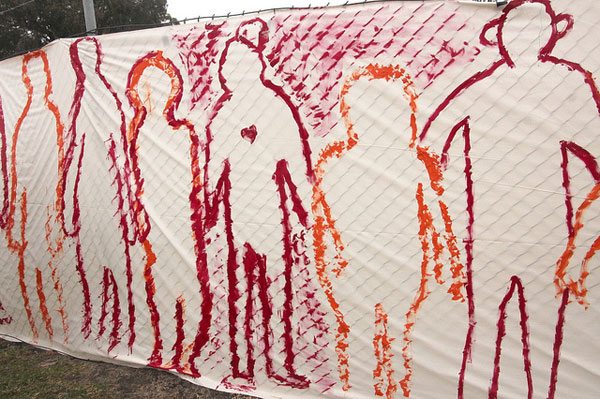
April 23, 2018; Colorlines
ProPublica and public radio station WNYC advise prospective players, “Have patience. You’ll need lots of it to play ‘The Waiting Game.’” Patience, plus a well-conditioned index finger to click through the seemingly endless screens—with simple graphics and simple, though often poetically repetitive, text—that trace the true-life stories of five asylum seekers.
“Game” is perhaps an overstatement, as the only options available to virtual viewers of “The Waiting Game” as each new frame appears are to “Keep going” or “Give up.” No actual harrowing escapes from another country, no real forms to fill out or interviews and medical examinations to live through. Still, the tedium of clicking from one day to the next, waiting for something, almost anything, to happen—while moody music and ambient sounds play in the background—is meant to simulate the long process of waiting—first to safely arrive in the US, then in a detention center, then perhaps in the home of a relative or in temporary housing, and ultimately for various parts of the immigration and legal systems to work through a staggering backlog of cases.
The multimedia experience was developed with help from gaming company Playmatics, but with the news organizations using “the same level of research and foundation in reality as a traditional news story.”
The online simulation is accompanied by an article titled “How Asylum Works—And Doesn’t Work” by ProPublica writer Kavitha Surana. This article takes a deep dive into the history and politics of the refugee process and describes a fragmented and expensive approach that was already in trouble even before the Trump administration began “framing the asylum system as a national security issue instead of a humanitarian program and characterizing asylum-seekers at the border as illegal entrants.” As Surana writes:
Sign up for our free newsletters
Subscribe to NPQ's newsletters to have our top stories delivered directly to your inbox.
By signing up, you agree to our privacy policy and terms of use, and to receive messages from NPQ and our partners.
The process can be exhausting and feel arbitrary—and as you’ll find in the game, it involves a lot of waiting. Once asylum seekers reach America, they must condense complex and often traumatic stories into short, digestible narratives they will tell again and again. Their lives often depend on their ability to convince a judge that they are in danger. Judicial decisions are so inconsistent across the country, success in complicated cases can come down to geography and luck—in New York City, only 17 percent of asylum cases are denied immigration in court; in Atlanta, 94 percent are. Increasingly, many asylum-seekers are held in detention for months or even years while going through the system. The immigration detention system costs more than $2 billion per year to maintain.
“The Waiting Game” offers five stories, all based on the experiences of real people from five different countries, with some details omitted to protect identities. Each represents one of five criteria listed in the definition for refugee status as defined in the 1951 United Nations Refugee Convention as updated in 1967: “A person who owing to a well-founded fear of being persecuted for reasons of race, religion, nationality, membership of a particular social group or political opinion, is outside the country of his nationality and is unable or, owing to such fear, is unwilling to avail himself of the protection of that country; or who, not having a nationality and being outside the country of his former habitual residence as a result of such events, is unable or, owing to such fear, is unwilling to return to it.”
Each story begins in another country—sometimes the individual’s homeland, sometimes another country he or she has been deported to. In addition to those seeking asylum, the stories offer insights into what the process might feel like for family members left behind or those already in the US, for workers in the complex immigration system or in the detention centers, and for the lawyers who take on asylum cases.
“The Waiting Game” is not meant to be a pleasant gaming experience, and while each story has occasional moments of joy and human connection, the game makes its point that the process takes a toll, even on those who only participate in a virtual way. For this writer, playing the game evoked the same kind of discomfort and disorientation as reading the 2017 novel Exit West by Mohsin Hamid. Still, I made it all the way through 699 days (i.e., clicks) to the end of one of the stories (and not the longest one); not bad considering that the website says the average player gives up after only 49 days.—Eileen Cunniffe












